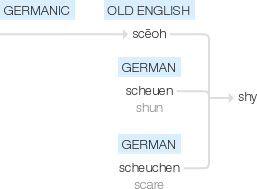Shy
Old English scēoh ‘(of a horse) easily frightened’, of Germanic origin; related to German scheuen ‘shun’, scheuchen ‘scare’; compare with eschew. The verb dates from the mid 17th century.
wiktionary
From Middle English shy(“shy”), from Old English sċēoh(“shy”), from Proto-West Germanic *skeuh(“shy, fearful”), from Proto-Germanic *skeuhaz(“shy, fearful”). Cognate with Saterland Frisian skjou(“shy”), Dutch schuw(“shy”), German scheu(“shy”), Danish sky(“shy”).
etymonline
shy (adj.)
late Old English sceoh "timid, easily startled, shrinking from contact with others," from Proto-Germanic *skeukh(w)az "afraid" (source also of Middle Low German schüwe, Dutch schuw, German scheu "shy;" Old High German sciuhen, German scheuchen "to scare away"). Uncertain cognates outside Germanic, unless in Old Church Slavonic shchuti "to hunt, incite." Italian schivare "to avoid," Old French eschiver "to shun" are Germanic loan-words. Meaning "lacking, short of" is from 1895, American English gambling slang. Related: Shyly; shyness.
shy (v.1)
"to throw (a missile) with a jerk or toss," 1787, colloquial, of unknown origin and uncertain connection to shy (adj.). Related: Shied; shying.
shy (v.2)
"to recoil," 1640s, from shy (adj.). Related: Shied; shying.
